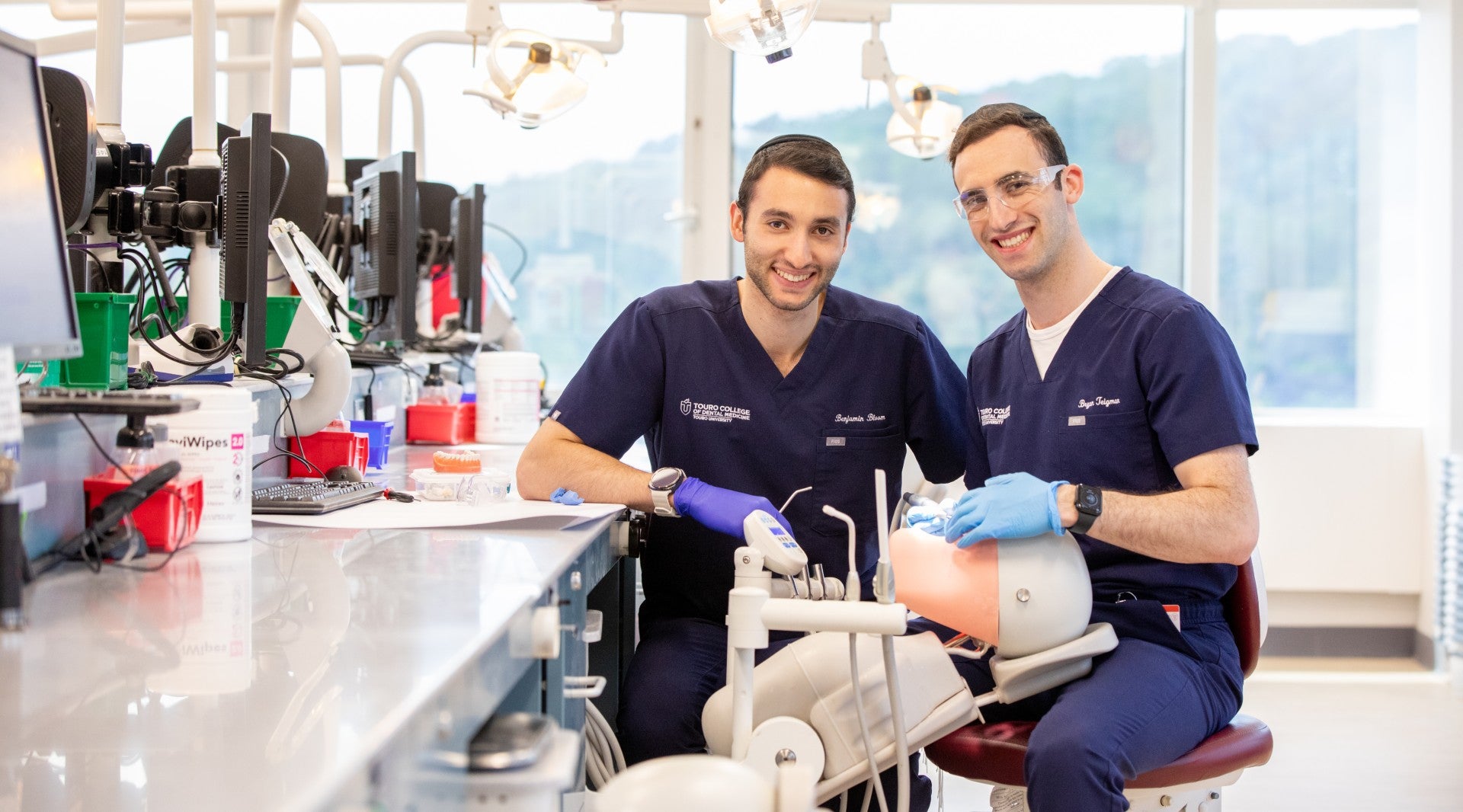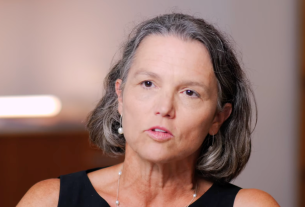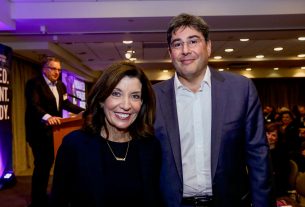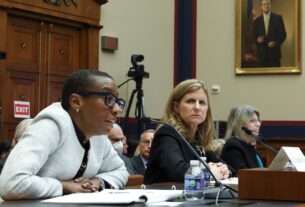NEW YORK — When Rachel Dahari went back to school in September to get a master’s degree in social work, she didn’t think the excitement around generative AI would be relevant to her education.
That quickly changed when she began to learn about the many ways AI was being used at her school. Social work students were using AI simulation technology to practice interactions with imaginary clients, getting tips for how to help them with substance abuse problems. Dahari learned that the program, CoPilot, could instantly find referrals for services her clients needed.
The experience turned Dahari, who supervises care managers at a home health care agency in New York, into an AI enthusiast.
“My brain opened up,” Dahari said. “Now I tell my care managers to use CoPilot.”
Dahari’s experience with AI at Touro University’s Graduate School of Social Work did not happen by chance. The university, which operates under Jewish auspices, always has made practical professional training a focal point of its academics. Now Touro is working to position itself as a leading adopter of AI in higher education across its 30-plus undergraduate, graduate and professional programs.
What a university-wide commitment to AI use looks like
This includes hiring high-level administrators to coordinate AI use throughout the university, providing grants for professors to explore how to incorporate AI in the classroom, and promoting the ethical use of AI tools among Touro’s 19,000 students. Last spring Touro launched a master’s degree program in AI studies, AI is taught across the computer science curriculum, and an undergraduate AI course is being developed for all majors in the STEM fields: science, technology, engineering and math.
“AI is increasingly central to how we learn and work,” said Dr. Alan Kadish, Touro’s president. “As a university guided by Jewish values, we want to harness this technology not just to enhance our courses of study and better prepare our students for professional success, but to do so in ways that improve society.”
“AI has the potential to revitalize higher education, if we do it right,” says Prof. Shlomo Argamon, the computer scientist recently hired as Touro’s first-ever associate provost for artificial intelligence. (Touro)
Last year, Touro hired its first-ever associate provost for artificial intelligence: computer science professor Shlomo Argamon. With students already rapidly adopting AI and likely to use it in the workplace after graduation, universities must make sure they learn to use it responsibly, ethically and in an educationally effective manner, Argamon said.
“All of our graduates — both as professionals and citizens — need to know about AI,” Argamon said. “In fact, AI has the potential to revitalize higher education, if we do it right.”
To support adoption of the technology, Touro recently issued university-wide guidelines on AI that encourage faculty to allow broad use of AI by students, provided students do the substantive work themselves and fully disclose their use of AI tools.
Last summer, approximately 85 faculty members received grants to explore ways to integrate AI into their teaching.
AI in practice
Jonathan Robinson, a Touro computer science professor, said he’s teaching students to use AI as they would a “chavruta” — a Hebrew term used to describe study partners who traditionally learn Jewish texts together, helping each other along the way. As with a chavruta, both partners in the study pair must be active.
Israeli AI entrepreneur and researcher Navot Akiva recently joined Touro’s faculty. An expert in machine learning, deep learning and natural language processing, Akiva is teaching courses in predictive AI and AI systems to students in Touro’s AI master’s degree program.
A new course at Touro’s law school examines the ways AI may challenge and disrupt existing legal and political institutions. In a medical school course on multiculturalism in medicine, students practice using AI so they can learn to identify cultural biases in the technology.
At Touro’s dental school, students are using AI to detect the scope and nature of tooth decay, assess whether a patient may be suffering from a condition called TMJ that causes jaw joint pain, and create crowns, bridges, and implants more quickly and effectively.
“AI has been integrated into everything we do,” said dental student Bryan Dovi Teigman.
Dr. Ben Schwartz, an associate professor at the dental school, said integrating AI into the curriculum has put his dental students “more ahead of the curve than students at other schools and even some dentists.” He added, “We know that AI use is the future of dentistry.”

Recent Touro graduate Yonatan Katz, who used AI in his studies and now works at the accounting firm Deloitte, said his experience showed him that AI doesn’t eliminate the need for human ingenuity. (Touro)
Balancing AI use and Jewish ethics
Ethical considerations and caution go hand in hand with the way the university is using AI, said Dr. Jamie Sundvall, Touro’s assistant provost of artificial intelligence and the assistant dean and director of distance education at the social work school. For example, she said, students learn how to review recorded counseling notes to ensure the AI does not violate patient privacy, make incorrect evaluations or recommend ill-advised treatments.
“The reality is that generative AI is not moral,” Sundvall said.
The focus on ethics is one hallmark of Touro’s Jewish character. The university, which was founded in 1971 to support traditional Jews who wanted to acquire a college education without compromising their Jewish observance, is guided by Jewish ethics and supports religious Jewish practice. Studies are suspended for the Jewish holidays, kosher food is available on all Touro campuses, and many Touro programs are designed with Orthodox students in mind — including flexible degree programs that allow students to balance their studies with other commitments, such as yeshiva study.
Touro’s flexible degree programs have proven very popular among non-Jews, too, who comprise a significant proportion of Touro’s student body.
As AI takes deeper root at Touro, Argamon and Sundvall are working with faculty to ensure that assignments are AI-proofed. This can mean redesigning curricula to be resistant to AI cheating, such as requiring students to complete writing assignments in class with pen and paper or produce personal videos rather than deliver written papers produced outside of class.
While many educators use programs that aim to detect illicit AI use by students, Argamon warns of the risks of doing so, including mistakenly accusing students of malfeasance.
“Throwing the book at students drives AI underground and hurts the teacher-student relationship that is the heart of the educational process,” Argamon said. “What we’re telling the faculty is that catching a student using AI is the beginning of a conversation.”
Looking ahead to the job market after graduation, the university is constantly assessing how to best prepare students to overcome the threats to entry-level jobs that AI presents.
Recent Touro graduate Yonatan Katz, who used AI in his studies and now works at the accounting firm Deloitte, said that his experience showed him that AI doesn’t eliminate the need for human ingenuity — or human workers.
“At the end of the day, we’re still going to need our brains,” Katz said.
Power the news that matters to you. Before 2025 ends, help (JEWISH REVIEW)’s independent, award-winning newsroom document Jewish history in real-time.




